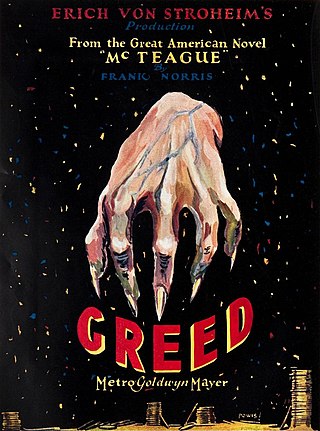
Greed is a 1924 American silent psychological drama film written and directed by Erich von Stroheim and based on the 1899 Frank Norris novel McTeague. It stars Gibson Gowland as Dr. John McTeague; ZaSu Pitts as Trina Sieppe, his wife; and Jean Hersholt as McTeague's friend and eventual enemy Marcus Schouler. The film tells the story of McTeague, a San Francisco dentist, who marries his best friend Schouler's girlfriend Trina.

ZaSu Pitts was an American actress who, in a career spanning nearly five decades, starred in many silent film dramas, such as Erich von Stroheim's 1924 epic Greed, and comedies, before transitioning successfully to mostly comedy roles with the advent of sound films. She also appeared on numerous radio shows and, later, made her mark on television. She was awarded a star on the Hollywood Walk of Fame in 1960 at 6554 Hollywood Blvd.

Erich Oswald Hans Carl Maria von Stroheim was an Austrian-American director, screenwriter, actor, and producer, most noted as a film star and avant-garde, visionary director of the silent era. His 1924 film Greed is considered one of the finest and most important films ever made. After clashes with Hollywood studio bosses over budget and workers' rights problems, Stroheim found it difficult to find work as a director and subsequently became a well-respected character actor, particularly in French cinema.

The Mask of Diijon is a 1946 American black-and-white horror noir suspense film released from PRC Studios, directed by Lew Landers and featuring Erich von Stroheim, Jeanne Bates and William Wright.
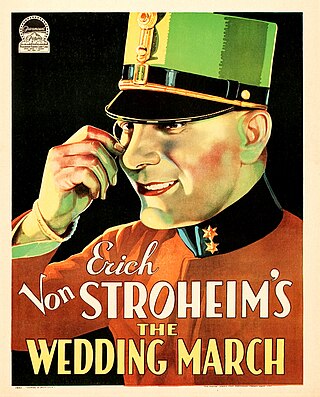
The Wedding March is a 1928 American synchronized sound romantic drama film written and directed by Erich von Stroheim. While the film has no audible dialog, it was released with a synchronized musical score with sound effects using both the sound-on-disc and sound-on-film process. The film stars Erich von Stroheim, Fay Wray and ZaSu Pitts. Paramount Pictures forced von Stroheim to create two films from the footage, the second being The Honeymoon. The Honeymoon is now considered lost, the only known copy destroyed in a fire in France in 1959.

Alraune, later renamed Unnatural: The Fruit of Evil, is a 1952 West German horror science fiction film, directed by Arthur Maria Rabenalt and starring Hildegard Knef and Erich von Stroheim. The film is based on the 1911 novel Alraune by German novelist Hanns Heinz Ewers. The plot involves a scientist who creates a woman (Knef) who is beautiful yet soulless, lacking any sense of morality.
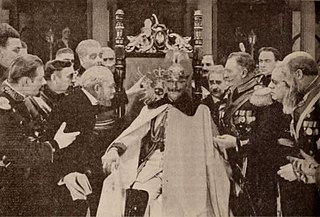
The Kaiser, the Beast of Berlin was a 1918 American silent war propaganda melodrama film produced and directed by, and starring, Rupert Julian. The screenplay was co-written by Rupert Julian and Elliott J. Clawson. The film's supporting cast included Elmo Lincoln, Nigel De Brulier, Harry Von Meter and Lon Chaney.

Foolish Wives is a 1922 American erotic silent drama film produced and distributed by Universal Pictures under their Super-Jewel banner and written and directed by Erich von Stroheim. The drama features von Stroheim, Rudolph Christians, Miss DuPont, Maude George, and others.

Blind Husbands is a 1919 American drama film written and directed by Erich von Stroheim. The film is an adaptation of the story The Pinnacle by Stroheim.
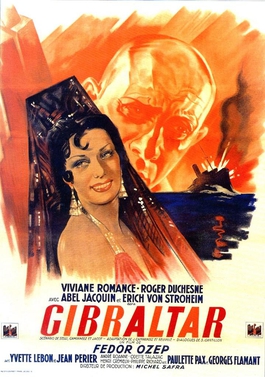
Gibraltar is a 1938 French spy film directed by Fedor Ozep and starring Viviane Romance, Roger Duchesne, Abel Jacquin and Erich von Stroheim. It was shot at the Joinville Studios in Paris, with location shooting taking place in Gibraltar itself despite the Spanish Civil War being fought across the border. The film's sets were designed by the art director Georges Wakhévitch. It was later remade in 1964 under the same title.

The Heart of Humanity is a 1918 American silent war propaganda film produced by Universal Pictures and directed by Allen Holubar. The film stars Dorothy Phillips, William Stowell, and Erich von Stroheim.

The Great Impersonation is a 1935 Universal Pictures American drama film directed by Alan Crosland and starring Edmund Lowe, Valerie Hobson and Wera Engels. It was adapted from the 1920 novel The Great Impersonation by E. Phillips Oppenheim. The film bears some aesthetic similarities to the Universal horror films of the 1930s. Two other film versions of the story were produced with the same title in 1921 and 1942.
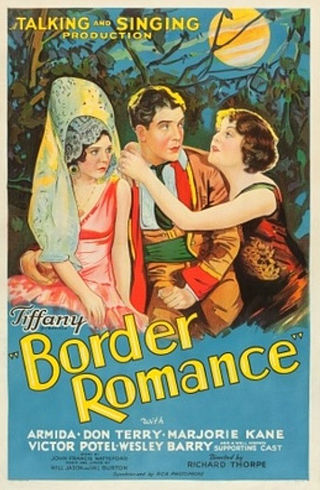
Border Romance is a 1929 American pre-Code Western romance film directed by Richard Thorpe. An early sound film, it stars Armida, Don Terry, Marjorie Kane, and Victor Potel.

The Unbeliever is a 1918 American silent propaganda film made towards the end of World War I. It was directed by Alan Crosland for the Edison Company towards its last days as a functioning film-making company. It stars Raymond McKee and Marguerite Courtot, who married a few years later, and Erich von Stroheim.

Hong Kong Nights is a 1935 American thriller film directed by E. Mason Hopper and starring Tom Keene, Wera Engels and Warren Hymer. An American customs agent tracks gunrunners operating out of Hong Kong. The film had no original copyright registration nor renewal, and is considered to be in the public domain.

Sweepstake Annie is a 1935 American comedy film directed by William Nigh and starring Tom Brown, Marian Nixon and Wera Engels.

My Ninety Nine Brides is a 1958 West German romantic comedy film directed by Alfred Vohrer and starring Claus Wilcke, Horst Frank and Wera Frydtberg. It was shot at the Tempelhof Studios in Berlin. The film's sets were designed by the art director Karl Weber.
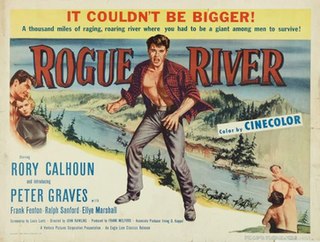
Rogue River is a 1951 American Western film directed by John Rawlins and starring Rory Calhoun, Peter Graves, Frank Fenton.
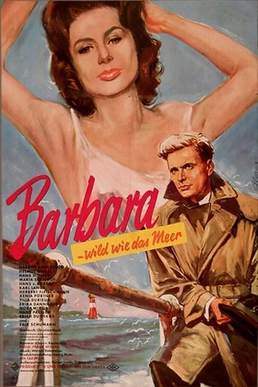
Barbara is a 1961 West German drama film directed by Frank Wisbar and starring Harriet Andersson, Maria Sebaldt and Carl Lange. The film was adapted from the 1939 novel of the same title by Jørgen-Frantz Jacobsen. It was filmed at studios in Copenhagen, with additional location shooting in the Faroe Islands where the film is set.

Rail Pirates is a 1938 French adventure film directed by Christian-Jaque and starring Charles Vanel, Suzy Prim and Erich von Stroheim. It was shot at the Victorine Studios in Nice and on location in the Camargue. The film's sets were designed by the art director Pierre Schild. It is based on a novel of the same title by the Belgian writer Oscar Paul Gilbert, who also contributed to the screenplay.




















